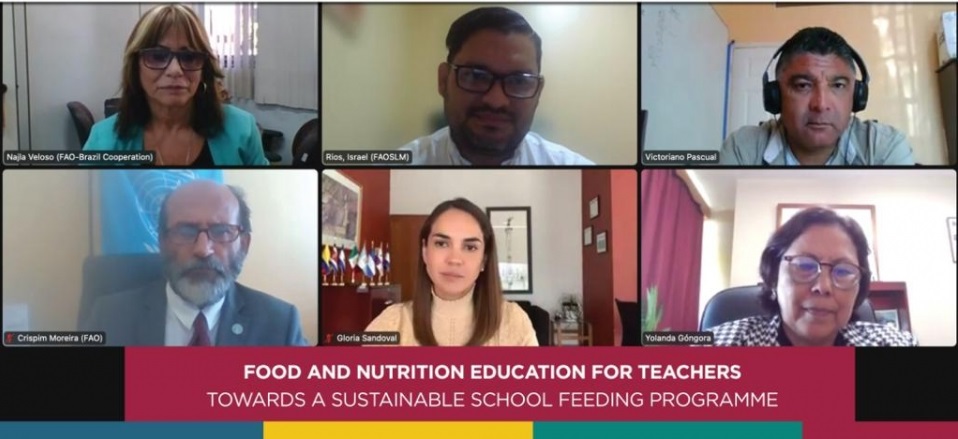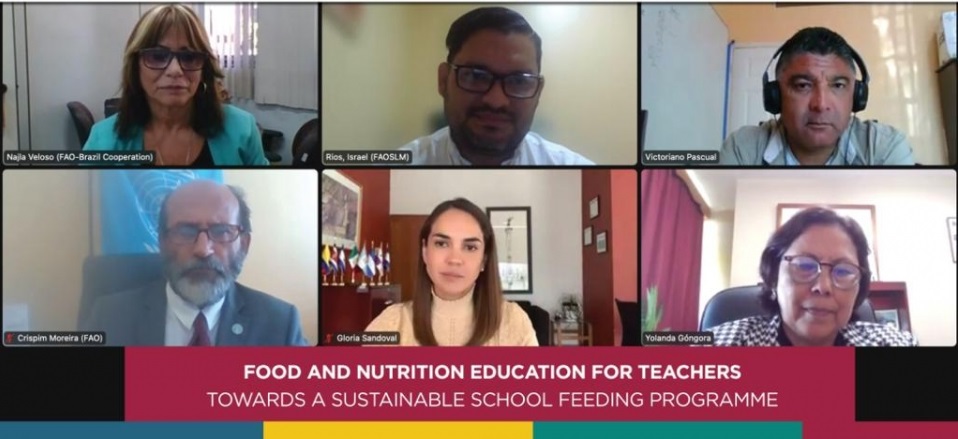Almost 100 teachers took part in the training focused on food and nutrition education
October 4rd, 2022. Belize – Between August 15th and 19th, 2022, the “Virtual Training on Food and Nutrition Education (FNE) for Teachers – Towards a Sustainable School Feeding Programme” took place, with the support of The Government of Belize and the participation of almost a 100 teachers from all around the country. It was developed in collaboration with the Food and Agriculture Organization of the United Nations (FAO) and the Mexican Agency for International Development Cooperation (AMEXCID) — in the framework of the Mesoamerica Hunger Free AMEXCID-FAO program— and with the support of the Brazil-FAO International Cooperation Programme.
The training involved meaningful activities related to the methodology, in order to achieve a shift of paradigms and mindsets. The commitment of the teachers allowed the facilitators to introduce basic concepts on food and nutrition education and together they discussed the viability of implementing adequate and effective activities on this matter among their students and the school communities.
The teachers learnt about concrete practices of the FNE activities and, by the end of the week, all the steps of this pedagogical process were highlighted and the teachers got involved in the design of a new work plan for them to replicate the same knowledge to other teachers back home.
As a result, now there are feasible action plans to implement at least one activity on food and nutrition education in each school, as well as drafts of rational work plans for replication sessions in a participatory and inclusive process. Emy Mendoza, teacher form the Hills of Promise Primary School, in Benque Viejo, Cayo, Belize, with more than 350 students currently enrolled, shared her experience participating in this training and replicating the process in her school.
“First, our teachers and administrative staff participated in the session I organized back at the school after I took the course. I shared with them all the information leant and the feedback was very positive. They embraced the plan I brought and it will start being implemented in the following days”, she shared.

The plan involves removing unhealthy snacks from the school cafeteria— food with excess of calories, sugars, saturated fats, trans fats and sodium—; explaining, through different means, the risk of consuming these kind of snacks; promoting healthy eating through games and activities; and allowing spaces where the school community can discuss and share observations, solutions and suggestions on how to have healthier eating habits together.
“We also talked to the parents of our students about the human right to food, the right to be free from hunger, the importance of consuming food locally produced and culturally adequate, shared statistics on obesity and overweight, and spoke about the promotion of healthy eating among our students. They were in full support of our healthy initiative and we even noticed that the students began bringing healthy snacks from home for lunch.”
The next step of the plan involves the implementation of school gardens to be used as teaching and learning tools and to produce fruits and vegetables for the students.
“I want to thank the Governments of Belize, Brazil, and Mexico for making this great experience possible, because the healthier our student are, the more they can learn and they will get to understand all the knowledge. The other teachers and I are thankful for this opportunity. Now our school is changing the way of consuming snacks; there are no more sugary juices; the families are cooking healthier at home; and they are consuming more fruit and vegetables”, she concluded.
The Government of Belize and the international cooperation institutions have expressed that it takes passionate teachers, willing to put their heart in this kind of processes and to take opportunities to learn and strengthen their capacities to help the country become healthier through meaningful and integrative education, and thanked them back.
Like Miss Mendoza, the other teachers are also bringing back the plan, the knowledge and all the information acquired to their own school communities. This training is an important strategy to contribute to guarantee de sustainable development of the school feeding policy of Belize.






